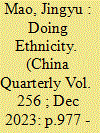| Srl | Item |
| 1 |
ID:
181886


|
|
|
|
|
| Summary/Abstract |
This article explores how “the multiplication of labour” can be used as a theoretical lens to make sense of the blurred boundaries between work and non-work spheres. It does so by drawing on the experiences of ethnic performers in Southwest China. Ethnic performance becomes a site of border struggles, as performers struggle with their desirable performance and undesirable presence, as well as work’s colonising effect over their personal lives. “The multiplication of labour” points to work’s diversification, meaning that performers are expected to do multiple aspects of labour at the same time, many of which are unrecognised and unremunerated. It also captures work’s intensification, which is shown not only through the prolonged working hours but also in how work intrudes into the most intimate areas of performers’ personal lives. In resistance, ethnic performers engage in a more playful and reflexive self-making, which is nevertheless constrained by ethnicity and gender.
|
|
|
|
|
|
|
|
|
|
|
|
|
|
|
|
| 2 |
ID:
193216


|
|
|
|
|
| Summary/Abstract |
Drawing on lengthy ethnographic fieldwork with ethnic performers in South-West China, this article seeks to explore the multi-layered ethnic scripts in contemporary China. Ethnic performers are people who perform ethnic songs and dances in restaurants or tourist sites, most of whom are rural–urban migrants from ethnic minority backgrounds. Ethnic performers’ ambivalences regarding whether they are “authentic minorities” points to the inadequacy of attempting to understand ethnicity in an essentialized way. Understanding ethnicity as something people do rather than who they are, the concept of “ethnic scripts” is proposed as a conceptual tool to illuminate the cultural and social repertoires which deeply shape people's understanding of and ways of doing ethnicity. By exploring the multi-layered meaning of ethnic scripts in contemporary China, this article highlights the ways that ethnic scripts are closely related to migrant performers’ emotions and sense of self, and addresses the fact that ethnic scripts are inherently gendered.
|
|
|
|
|
|
|
|
|
|
|
|
|
|
|
|